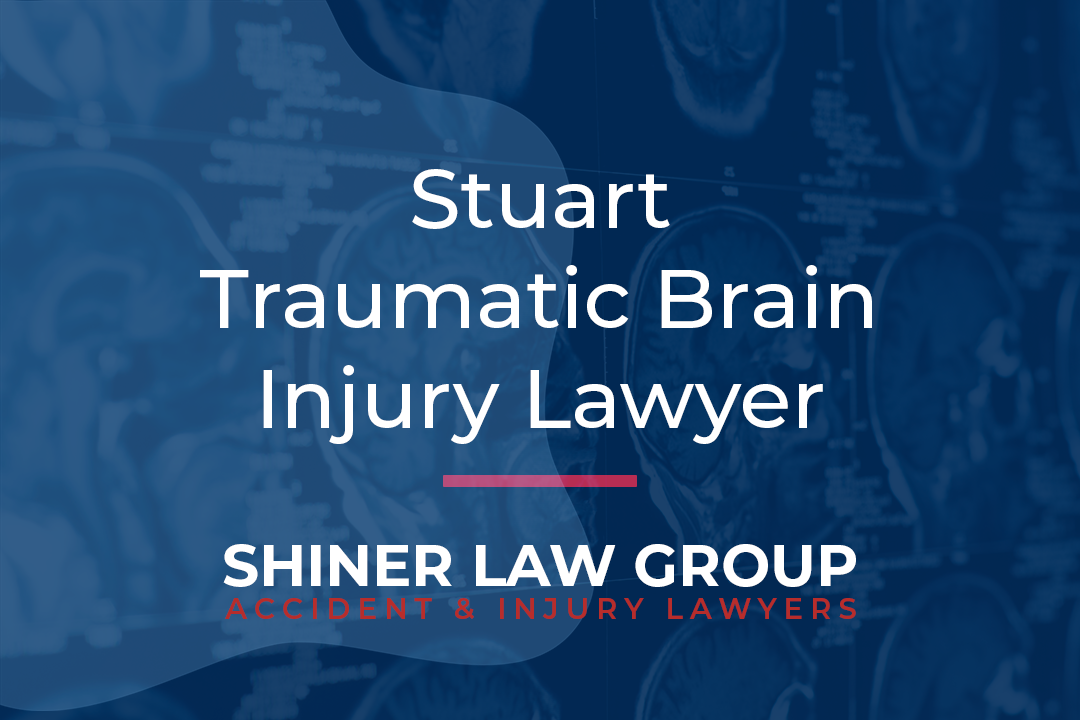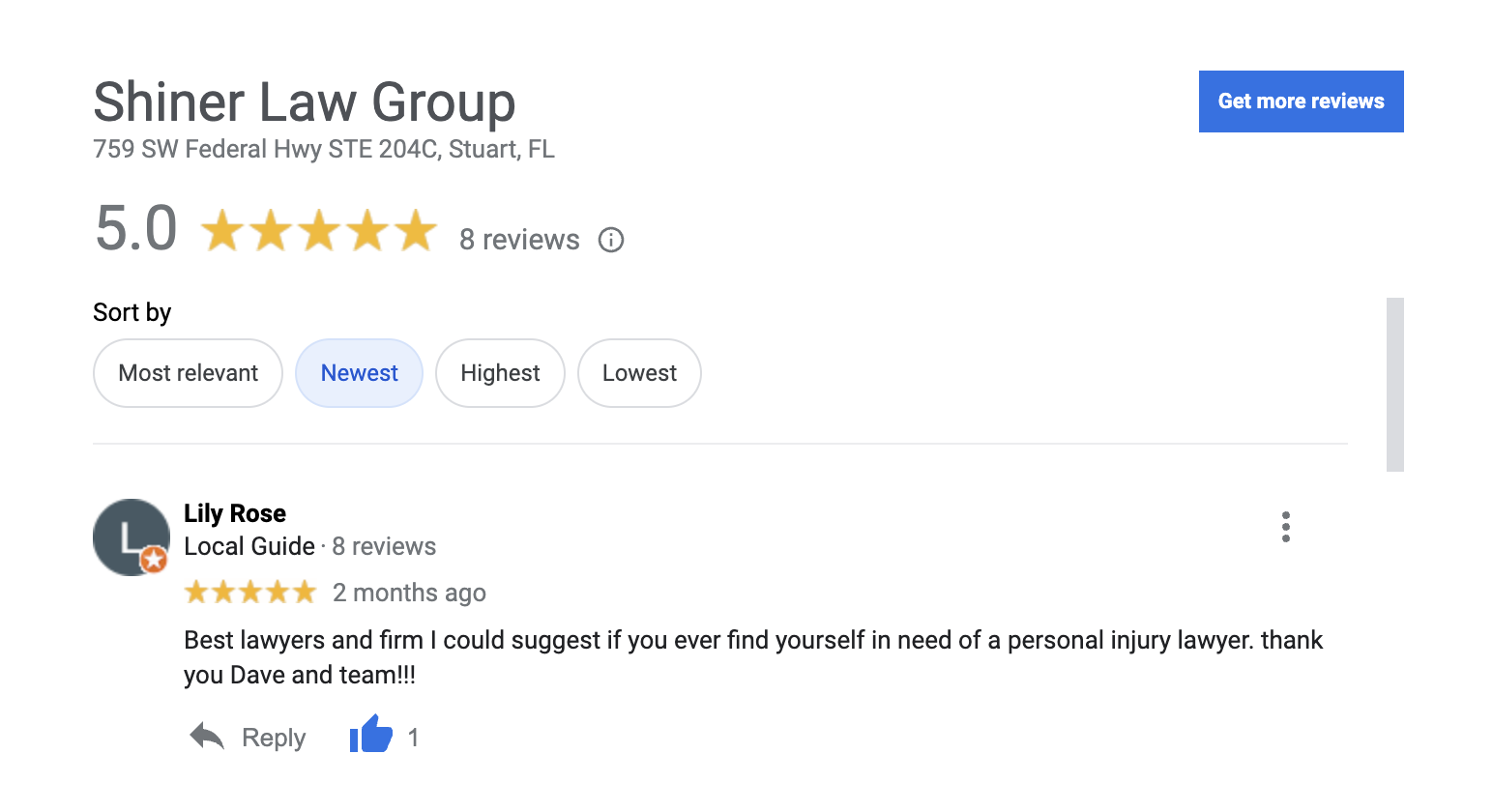 Did you suffer a traumatic brain injury (TBI) as a result of an accident in Stuart, FL? Our experienced Stuart traumatic brain injury lawyers at Shiner Law Group are ready to help fight for your legal rights and get the compensation you deserve. Call us today at (772) 777-7700 to speak with an attorney for a 100% free consultation.
Did you suffer a traumatic brain injury (TBI) as a result of an accident in Stuart, FL? Our experienced Stuart traumatic brain injury lawyers at Shiner Law Group are ready to help fight for your legal rights and get the compensation you deserve. Call us today at (772) 777-7700 to speak with an attorney for a 100% free consultation.
You may be entitled to seek compensation for medical bills, loss of income, pain, and suffering, and more. Contact our Stuart, FL law offices to discuss the legal options that might be available to you following your traumatic brain injury accident. The next steps are very important. Let Shiner Law Group help you with your traumatic brain accident case today.
Did You Suffer a Traumatic Brain Injury in Stuart?
Brain injuries often significantly impact your life and your family’s life. Even though some who have suffered a traumatic brain injury seem fine, they may struggle each day to deal with the injury that has changed their life forever.
Usually, brain injuries are caused by a rapid forward and backward motion or a sudden blow to the head. These actions can damage the brain and cause a traumatic brain injury.
If you suffer a brain injury, you have rights. One of these rights is to collect compensation from the at-fault party if someone else’s negligence or fault caused the injury.
However, since these cases can be challenging to prove, it’s a good idea to contact and utilize the services of a Stuart traumatic brain injury lawyer.
Statistics About Stuart Traumatic Brain Injuries
According to the CDC, approximately 2.8 million TBIs occur each year. With so many individuals impacted by this injury, it is considered a serious health concern in the U.S.
It’s also been reported that brain injuries cause around 33% of deaths in the U.S. are caused by an injury. The cost of these injuries in terms of lost income and medical bills exceeds $76 billion annually.
If you or someone in your family has suffered a brain injury, you likely understand it can impact all parts of your life. You also understand the cost related to treatment, ongoing care, and change in your mood, personality, and cognitive function can be extreme. In worst-case scenarios, the individual who experienced the brain injury passes away. Contacting a Stuart traumatic brain injury attorney is highly recommended in any situation where a brain injury occurs.
Common Causes of a Stuart Traumatic Brain Injuries
TBIs are classified as severe injuries. They can also have long-lasting effects. The injury (as mentioned above) is caused by some type of blow or fast head motion that impacts the brain. Older adults and children are especially vulnerable to suffering a TBI.
Several situations can cause a traumatic brain injury. Sometimes, a TBI occurs after a car accident, to someone playing contact sports, or when someone falls and hits their head. A TBI occurs when the brain collides with the skull’s interior because of the violent impact. The impact then injuries the brain.
Some of the injuries the brain may experience include:
- Tearing of the brain tissue
- Bleeding
- Bruising
In some extreme cases, if a skull fracture occurs, a skull fragment may penetrate or pierce the brain, leading to catastrophic injuries.
Today, head injuries are classified into one of three general categories that can cause a TBI. These include:
- Closed Head Injury: Extremely common injuries often undetected and left untreated. This occurs because direct force causes the head to move quickly in a single direction. At this point, the brain is forced against the skull, which causes cell damage.
- Penetrating Brain Injury: This usually occurs if the skull has cracked and the brain is punctured, bruised, or impacted as a result.
- Crushing Injury: The brain may be injured if the skull is compressed between two objects.
Common Signs and Symptoms of a Stuart Traumatic Brain Injury
If someone is involved in an accident where a traumatic brain injury is possible, they and their family must recognize the signs of a TBI. Some of the most common signs and symptoms of a TBI include:
- Headaches
- Double vision
- Coma
- Mood changes
- Muscle spasms
- Blindness
- Fatigue
- Seizures
- Disorientation or confusion
- Ear ringing
- Nausea
- Impaired judgment or thought
- Sensitivity to light or sound
- Problems smelling
- Impulse control issues
- Numbness in the extremities
- Issues communicating
- Speech issues like slurring
- Loss of memory or ability to concentrate
- Anxiety or depression
Symptoms that accompany a TBI may be permanent, intermittent, or temporary. Someone who has suffered a brain injury may also have to re-learn basic tasks and engage in rehabilitation therapy. Sometimes death results from the injury, too.
Potential Long-Term Effects of Traumatic Brain Injuries
Each TBI case is unique. The long-term impact of a brain injury varies, too. Sometimes, the impact of a TBI is more significant and severe than in others; however, no matter the case, a traumatic brain injury is extremely dangerous.
Some long-term risks of a TBI include:
- Seizures
- Significant memory loss
- Alzheimer’s disease
- Other degenerative functions
Sometimes, a TBI is treatable. However, in other situations, the only way to know if you or someone will improve after a TBI is to wait for time to pass. Lasting life changes may occur slowly. Also, some TBI victims discover the effect of the injury cannot be reversed.
Any physical injury or disability related to the occurrence of a TBI is typically easy to detect; however, the emotional impact of the injury is much harder to understand.
Some people who suffer a TBI become depressed because they feel like they have suffered a loss. If the individual experiences a personality change, it may cause violent, moody, or aggressive actions and behavior. Unfortunately, the person you knew before the occurrence of the TBI may disappear completely. For most, this devastates the injured party and their family and friends.
Understanding Anoxic Brain Injuries in Stuart
Brain injuries caused by a blow to the head or violent movement of the skull are not the only type that can occur. Another brain injury that may occur is due to a lack of oxygen. The medical term for this is hypoxia, referred to as an anoxic brain injury.
This type of traumatic brain injury can be classified into four different types. However, it’s worth noting that no matter the case, the brain tissue will start to die after it goes four minutes without oxygen.
The four types of anoxic brain injuries include:
- Anoxic Anoxia: A lack of sufficient oxygen in the air causes this type of brain injury. Being in high altitudes and carbon monoxide poisoning can result in this injury. Drowning can also lead to it. If there is not enough oxygen present, your body and brain will start to suffocate.
- Stagnant Anoxia: Called a hypoxic ischemic injury, Stagnant Anoxia occurs because of an internal issue that keeps oxygen-rich blood from making it to the brain. Some things that may lead to this brain injury include cardiac arrhythmia, strokes, and cardiac arrest.
- Toxic Anoxia: Just like the name implies, this brain injury occurs because of toxins present in your body that keep oxygen present in your blood from being used effectively. Illegal drugs and chemicals and carbon monoxide positioning can also cause toxic anoxia.
- Anemic Anoxia: If your blood cannot carry oxygen to your brain, you may suffer anemic anoxia. It’s a typical result of lung disease and can result from acute hemorrhaging, chronic anemia, or carbon monoxide poisoning.
It’s important to note that no matter the case, any brain injury is a serious condition. Suppose you find yourself in a situation where someone else caused your traumatic brain injury due to an accident, medical malpractice, or negligence. In that case, you have the legal right to seek compensation from the at-fault party.
Filing a Lawsuit For a Stuart Traumatic Brain Injury
If someone else’s negligence caused your traumatic brain injury, Stuart law gives you two years to file a lawsuit against the at-fault party or entity. You can go through the insurance company or even seek workers’ compensation benefits, too. Because of the options available, it’s a good idea to speak with an attorney about your rights and the options you have before you act. This will help ensure that you get the compensation you deserve.
Tips for Winning a Traumatic Brain Injury Lawsuit in Stuart
No law firm or attorney can guarantee that your lawsuit will be successful regardless of how experienced they are or how many cases they have won. Everything depends on the details of your case, the way your attorney presents your argument, and the jury and judge who is presiding over your case.
With that in mind, you must work to prove the elements below if you want a chance to win compensation in your traumatic brain injury case. These elements include:
- You were owed a standard of care or duty of care from the at-fault party
- The person accused of causing the injury was reckless or negligent
- It resulted in the accident that caused the injury
- The injury resulted in damages like lost wages, medical costs, and more
Negligence Defined in Traumatic Brain Injury Cases
You can experience a brain injury from many accidents, including medical malpractice, defective products, auto accidents, boat accidents, etc. Because of the varied causes of brain injuries, negligence can also be in several forms.
In an auto accident, negligence may be because the at-fault driver was speeding, not following the road rules, or was distracted. With boating accidents, the operating may be considered negligent if there are hazards on their vessel, like a slippery deck that caused a slip and fall. When negligent medical professionals are at-fault, the reason may be an undiagnosed traumatic brain injury that gets worse.
While the possibilities may seem like they are ongoing, you can think about who would have been responsible, and if you answer with the name of another person or a business, then you may have grounds for a viable lawsuit.

Types of Damages You Can Recover After a Traumatic Brain Injury in Stuart
The damages related to your case refer to the losses you experienced.
The economic damages you receive refers to the out-of-pocket monetary losses you experience, like medical costs, lost wages, and other injury-related costs. You can also recover anticipated losses you may experience, such as diminished earning capacity or the cost of medical care you will need in the future.
You may also recover non-economic damages. These are non-tangible damages that you are entitled to, such as the loss of consortium, pain and suffering, and others.
Stuart uses comparative negligence laws to assign a percentage of damages based on how much fault each person involved carries. An example is if a property owner is discovered to be 80% at fault for hazardous conditions that resulted in your fall, then you will receive 80% of the total damages awarded to you. This means if your award was $100,000, you would receive $80,000.
Common Questions about Stuart Traumatic Brain Injury Claims
Some of the most common questions related to brain injury claims in Stuart are answered below.
How can you tell if you have a valid claim after a brain injury?
Several factors must be considered to determine if you can pursue a traumatic brain injury claim. This includes damages, causation, and liability. To know for sure if you can recover compensation, you should schedule a meeting with an attorney who specializes in these cases.
How long do you have to file a brain injury lawsuit?
Stuart has established a clear and concise deadline regarding how long you have to recover damages from a personal injury, including a traumatic brain injury. In the state, the statute of limitations is just two years. However, there are situations where the time period is even less than this, which is why it is best to speak to an attorney as soon as possible after the injury occurs.
Is it likely that your case will go all the way to trial?
Most traumatic brain injury claims will be settled before reaching trial. However, how willing and prepared your lawyer is for trial will help to improve your chances of success during settlement negotiations. Remember, it is best to find an attorney who is willing to take your case to court if they cannot negotiate a fair settlement from the other party.
Should you take a settlement offer from the at-fault party’s representation or insurance company?
You should never accept a settlement offer until you have spoken to your attorney. They will know if you are receiving a fair offer and can provide advice on when you should and should not settle. After all, if you accept a settlement and then discover your injuries are worse than you initially thought, you have no option to recover additional compensation.
Can you recover money for the funds you would have earned during the entirety of your career?
When an attorney calculates your damages, they will consider the impact that your traumatic brain injury will likely have on your ability to earn money down the road. They will talk to industry experts, financial planners, medical doctors, and economists who will help ensure you get the compensation deserved for your injuries.
Hire a Stuart Traumatic Brain Injury Attorney Near Me to Help
If you or a person in your family suffers a traumatic brain injury, no matter the severity, caused by someone else’s negligence or wrongful act, you have the right to file a lawsuit and recover compensation. Hiring a Stuart traumatic brain injury lawyer is highly recommended to help ensure you get the compensation you deserve for your injury. There is no reason to suffer after a brain injury. Contact us today at (772) 777-7700 to speak with a lawyer or fill our our free online case evaluation form below to discuss your case details.
Stuart Traumatic Brain Injury Lawyer Review

Stuart Traumatic Brain Injury Law Office
Shiner Law Group
759 SW Federal Hwy, STE 204C
Stuart, FL 34994



